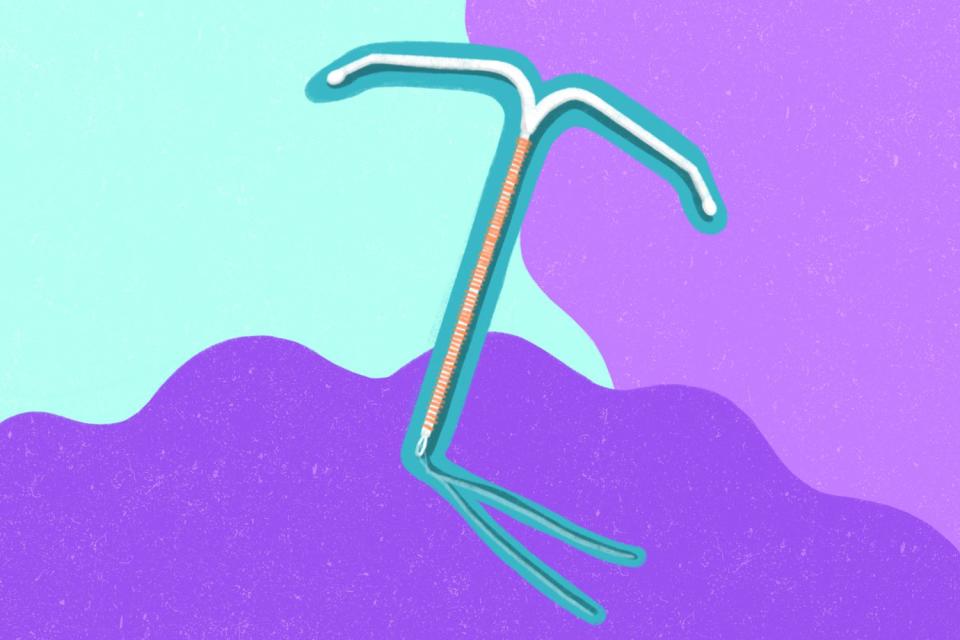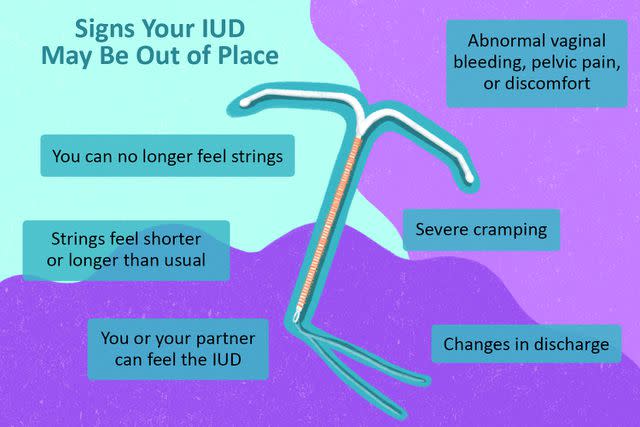Can You Become Pregnant With an IUD In?
Signs, Potential Complications, and What Happens Next

Verywell / Danie Drankwalter
Medically reviewed by Renita White, MD
An intrauterine device (IUD) is a popular form of reversible birth control. Both hormonal and copper IUDs are more than 99% effective at preventing pregnancy with typical use. However, it still is possible to become pregnant if you have an IUD.
Becoming pregnant with an IUD inserted can be dangerous, so it's important to contact your healthcare provider if you suspect you may be pregnant. Your healthcare provider will discuss your options for terminating the pregnancy or what to do if you want to continue with the pregnancy.
This article will discuss becoming pregnant while you have an IUD, why it can happen, the risks to the pregnant person and fetus, and your options if this occurs.

Verywell / Danie Drankwalter
What Is an IUD?
An IUD is a small T-shaped device that is inserted into the uterus for long-acting, reversible contraception. There are two types: hormone-releasing IUDs (Kyleena, Liletta, Mirena, and Skyla) and the copper IUD (Paragard).
The placement of the IUD is a simple procedure usually done in your healthcare professional’s office. Your healthcare provider will insert the device through your vagina and cervix.
Two strings attached to the T-shape device remain hanging through your cervix in order for you and your healthcare provider to check placement.
Is It Possible to Get Pregnant With an IUD?
The IUD is considered a highly effective form of birth control. Still, there is a very small risk of unwanted pregnancy, and it is possible to become pregnant with an IUD. The failure rate of IUDs may be as low as 0.02%, meaning pregnancy could happen in about 1 out of every 5,000 people with an IUD.
There are a few reasons pregnancy could occur in people with an IUD. In some cases, a person could become pregnant before the IUD is effective since not all types are effective immediately.
Copper IUDs, like Paragard, protect against pregnancy immediately because the copper changes the environment in the uterus, making it toxic to both the sperm and the egg. This prevents the sperm from reaching the egg and the egg from attaching to the uterine wall.
Hormonal IUDs, like Mirena or Kyleena, take about seven days to start working. These types are generally considered effective immediately if inserted during your period because of where you are in your menstrual and ovulation cycles.
If you have a hormonal IUD inserted, it’s recommended to use a backup contraceptive method or abstain from intercourse for seven days.
In other cases, pregnancy could occur if the IUD shifts its position. In a small number of people, the IUD may slip partially or entirely out of the uterus (called expulsion). If the IUD shifts, even partly out of position, it will no longer be fully effective at preventing pregnancy.
Another potential way pregnancy can occur is if the IUD remains in your body longer than its recommended expiration date. The amount of time an IUD can stay in and remain effective depends on the type of IUD. The manufacturer recommendations for a few IUDs are:
Skyla: Up to three years
Kyleena: Up to five years
Mirena: Up to eight years
Paragard: Up to 10 years
Liletta: up to eight years
If you suspect any problems with your IUD or that you’re pregnant, talk with your healthcare professional immediately.
Signs Your IUD Is Out of Place
These signs indicate your IUD is out of place and you may be at risk of pregnancy:
The strings feel shorter or longer than usual.
You or your partner can feel the IUD itself.
You have pelvic pain or discomfort.
You experience abnormal vaginal bleeding.
Severe cramping or changes in discharge occur.
Symptoms of Pregnancy With an IUD
If you do become pregnant with an IUD, you may notice some of the typical signs of early pregnancy, such as:
Missed periods
Nausea and vomiting
Headaches
Sore and enlarged breasts
Tiredness or fatigue
Mild cramping
Light spotting
Many of the side effects of early pregnancy are similar to side effects caused by your IUD—like changes in your period, spotting, and cramps. If you have any questions or concerns, talk with your healthcare provider.
Taking a Pregnancy Test
If you suspect you’re pregnant, consider taking an at-home pregnancy test. These tests claim to be up to 99% effective. In most cases, the tests provide accurate results, but their reliability depends on following the instructions and not testing too early after conception.
It’s also recommended that you discuss your concerns and symptoms with your healthcare provider to ensure the IUD is working correctly. They may also perform a pregnancy test in the office to confirm whether you are pregnant.
Risks of Pregnancy With an IUD
While pregnancy with an IUD is uncommon, it can be dangerous for the woman and the fetus. In some cases, a pregnancy with an IUD may result in an ectopic pregnancy.
Ectopic Pregnancy
An ectopic pregnancy is a rare condition in which the egg attaches to tissue outside of the uterus, such as the lining of the fallopian tubes. If this type of pregnancy isn’t terminated, it can cause tears, bleeding, and even death.
Becoming pregnant with an IUD in place increases your risk of:
Miscarriage (spontaneous abortion)
Preterm delivery (giving birth before 37 weeks of the pregnancy)
Infection in the uterus
Infection of the fluids and tissue around the fetus
Slow growth of the fetus
Early membrane rupture (your water breaking before labor begins)
Low birth weight (when an infant is born weighing less than 5 pounds and 8 ounces)
When to See a Healthcare Provider
If you suspect any problems with your IUD or that you’re pregnant, see a healthcare professional immediately. Being pregnant with an IUD in place can be dangerous, and it’s important to determine if you’re pregnant.
Terminating the Pregnancy
If you’re considering ending the pregnancy, talk with your healthcare professional. In cases like an ectopic pregnancy, the pregnancy must be terminated because of health risks to the pregnant person. Also, the embryo is unable to survive when growing outside the uterus.
Pregnancies can be terminated with:
Medication: If you’re in the first 10 weeks of pregnancy (10 weeks since your last menstrual period), the pregnancy may be terminated with medication.
Surgery: After the first 10 weeks, typically, surgery is required to terminate the pregnancy.
Depending on where you live, your options for terminating the pregnancy may vary.
What Happens if You Want to Continue the Pregnancy?
If you choose to continue with the pregnancy, a healthcare professional will likely remove the IUD. This may help reduce the risks of complications, but the pregnancy will still be considered high risk. The risk of an ectopic pregnancy is higher with IUDs than with other types of birth control. However, it is important to note that in general IUD users have a significantly lower risk of pregnancy, including ectopic pregnancy, compared to those not using contraception or on other methods of contraception.
Still, it is possible to deliver a healthy baby if the embryo is viable. Your healthcare professional will help you choose the best options for your health and the fetus.
Summary
An IUD is a highly effective form of birth control. In rare instances, you can still become pregnant with an IUD, especially if it has become dislodged or is past its effective period. Pregnancy with an IUD in place brings increased risks to the pregnant person and the fetus.
If you suspect your IUD is not effective, contact your healthcare professional. If you are pregnant and wish to continue the pregnancy, you will likely need to have the IUD removed and be monitored for complications throughout your pregnancy.

